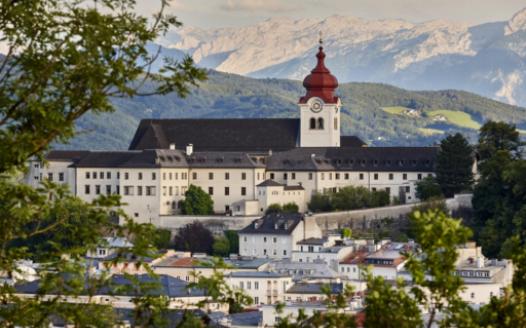The city of Salzburg, Austria holds a special place in the history of classical music as the birthplace of one of the greatest musical geniuses the world has ever known – Wolfgang Amadeus Mozart. From the influence of the Salzburg Cathedral to the guidance of his father, Leopold Mozart, and his early training in 18th-century Salzburg, Mozart's formative years played a crucial role in shaping the extraordinary talent that would captivate audiences for centuries to come. Let's delve into the early years of this musical prodigy and explore the foundations of his unparalleled genius.

Salzburg Cathedral: The Musical Influence on Mozart's Formative Years
Salzburg Cathedral played a significant role in shaping the musical talent of Wolfgang Amadeus Mozart during his formative years. The magnificent cathedral, located in the heart of the historic city of Salzburg, provided a rich and inspirational setting for Mozart to develop his passion for music.
As a young boy, Mozart spent many hours at Salzburg Cathedral, where he was exposed to the awe-inspiring sounds of the church's organ and choir. The grandeur of the cathedral's architecture and the solemnity of the religious ceremonies that took place within its walls undoubtedly left a lasting impression on the young prodigy.
Mozart's frequent visits to Salzburg Cathedral allowed him to study and absorb the intricacies of sacred music, which would later influence his own compositions. The harmonies and melodies he heard within the cathedral's walls served as a source of inspiration for his own musical creations, helping to shape his unique style and genius.
The musical education that Mozart received at Salzburg Cathedral, both formally and informally, played a crucial role in his development as a composer and performer. The cathedral provided a nurturing environment where Mozart could hone his craft and cultivate his extraordinary talent, setting the stage for his future success and legacy in the world of classical music.
In conclusion, Salzburg Cathedral served as a powerful musical influence on Mozart's formative years, helping to shape the genius of one of the greatest composers in history. The cathedral's role in nurturing Mozart's passion for music and providing him with a foundation in sacred music highlights its significance in the early development of a musical prodigy.
Leopold Mozart: The Father Behind Mozart's Early Success
Leopold Mozart was a key figure in the early success of his son, Wolfgang Amadeus Mozart. As a musician and composer himself, Leopold recognized his son's talent from a very young age and dedicated himself to nurturing and developing his musical abilities. Leopold served as both a mentor and a manager for Mozart, guiding him through his early years as a child prodigy and helping him navigate the world of music and performance. Leopold's support and encouragement were instrumental in shaping Mozart's early musical development and laying the foundation for his later success as one of the greatest composers of all time.
Mozart's First Composition: Unraveling the Musical Genius of a Child Prodigy
At just five years old, he had already begun to write his own musical compositions, displaying a natural gift for creating melodies and harmonies that would later become iconic works of classical music.
Even at such a tender age, Mozart's compositions were noted for their complexity and originality, showcasing a depth of musical understanding that was far beyond his years. His earliest works, such as the minuets and piano pieces he composed as a child, demonstrated a mastery of form and structure that belied his youth.
What is perhaps most astonishing about Mozart's early compositions is the sheer variety and range of styles that he was able to master at such a young age. From playful and lighthearted melodies to solemn and contemplative themes, Mozart's musical genius knew no bounds, as he effortlessly moved between genres and moods with ease.
It is clear that Mozart's first compositions were a testament to his extraordinary talent and innate musical ability. They laid the foundation for the prolific and groundbreaking career that would follow, solidifying his reputation as one of the greatest composers in history. In unraveling the musical genius of this child prodigy, we gain a deeper appreciation for the brilliance and creativity that defined Mozart's legacy.
Education in 18th-Century Salzburg: How Mozart's Early Training Shaped His Talent
In 18th-century Salzburg, education played a crucial role in shaping the talent of young musicians like Mozart. At a young age, Mozart began his formal musical training under the guidance of his father, Leopold Mozart, who was a respected composer and musician in his own right. Leopold recognized his son's exceptional talent early on and dedicated himself to providing Mozart with a comprehensive musical education.
Mozart's education in Salzburg consisted of studying various musical instruments, including the piano, violin, and organ. He also received instruction in music theory, composition, and performance. Mozart's education was rigorous and demanding, with long hours of practice and study each day. He was expected to master not only the technical aspects of music but also to develop his own unique artistic voice.
In addition to his formal education, Mozart was exposed to a wide range of musical styles and genres through performances and concerts in Salzburg. He studied the works of the great composers of his time and incorporated elements of their music into his own compositions. This exposure to different musical traditions and innovations helped Mozart develop his own distinctive style and approach to music.
Mozart's education in 18th-century Salzburg was instrumental in shaping his talent and laying the foundation for his future success as a composer. The rigorous training he received from his father and other mentors in Salzburg equipped him with the technical skills and artistic vision necessary to become one of the greatest musical geniuses of all time.
